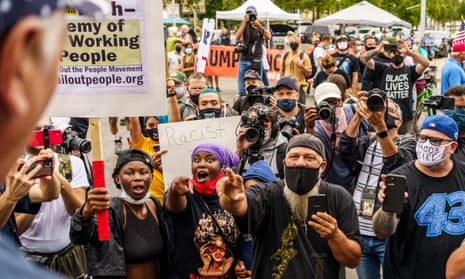In 1989, I visited Sarajevo for a literary festival. My family spent our days at poetry readings, in cafes, exploring the city’s mosques, museums, its spectacular Eastern Orthodox churches, its synagogue and ancient bazaar. It was a beautiful city, part Hapsburg, part Ottoman, part former Soviet satellite. I remember telling my two sons: This I what civil society looks like! Watch how often, on buses and trams, young people offer their seats to the elderly!
Three years later, the city had become a battleground in the bloody civil war that pitted Serbs against Muslims against Croats. The cafes were in ruins, the National Library destroyed along with 2m priceless books. Citizens barricaded themselves in their dark, cold homes, racing out to get food as Serbian snipers shot at them from the hills.
Ever since, what happened in Sarajevo has seemed to me like a lesson – a cautionary example of how quickly and drastically the social contract can be not just broken but ripped to shreds, how easily ethnic and religious differences can be exploited by totalitarian leaders who use violence to consolidate their power. Those who say it can’t happen in the United States point to our democratic tradition, to the troubled religious, ethnic and racial divisions that had long plagued the countries that eventually erupted in armed slaughter. But it’s naive not to recognize that our country has been in trouble since the first explorer killed the first indigenous person, since the first slaves were brought over to work in our households and fields.
The news from Kenosha, Portland and elsewhere around the United States reminds us of how badly things can go wrong. In Kenosha, 17-year-old Kyle Rittenhouse has been charged with killing two Black Lives Matter protesters. In Portland, a pro-police supporter was shot during a protest that turned violent. Armed militias have shown up to protect Confederate statues and barbershops defying the mask regulations; ugly fist fights have broken out. And no one knows what to believe. Republicans dismiss fake news, while Democrats may think of the provocateurs who encouraged 1960s radicals to commit violent acts, and of the manufactured crises that have incited mass extremism: the burning of the Reichstag.
Let’s imagine, if we still can, a president who truly loved our country. Surely that leader’s heart would break to see how deep and hostile our divisions have become. So what are we to think when Donald Trump exploits our problems in his bid for re-election, when he fans the flames of hatred, when he responds not like a grieving leader but like a dog-fight fan at a dog fight, like a giddy, unpleasant 12-year-old playing a violent video game. How can anyone with a beating human heart compare a police officer who shoots our citizens to golfers who “choke” attempting to sink “a 3ft putt?” How convenient for the government that the increasingly bitter culture wars distract us from the fact that Covid-19 has killed 180,00 Americans. And every tweet from the White House, every one of Trump’s tasteless jokes and outrageous remarks undermines the image that the Republican national convention tried so hard to create: a leader who loves America.
Never has it been clearer that we need leaders who genuinely care about all Americans, about fixing the flaws that have been in this country’s design since its inception, about addressing the stresses that so many Americans endure as they scramble for housing, healthcare, education for their kids and, in growing numbers, for a job. Instead of which we get the spectacle of a man who seems to enjoy our pain the way he relished the conflicts, the anxiety and humiliation of the contestants on The Apprentice. How could anyone, let alone the head of our nation, not feel a sense of anguish about the death of George Floyd, Breonna Taylor and so many others, and now the wounding of Jacob Blake.
Our profoundly serious problems – racism, income inequality, to name just two – will be hard to fix, but it turns out to be horrifyingly easy to worsen them. All it takes are a few tweets and a badly timed presidential visit to Kenosha. How comforting it must be to hear the president insist that our troubles don’t exist. But they do – and they aren’t getting better when teenage boys are given guns and urged to help the police.
Obviously, escalating violence isn’t the answer. The old blues lyric says, “There wouldn’t be so much hunting if the rabbit had a gun.” But it won’t be a pretty picture if both the hunters and the rabbits are locked and loaded. I don’t know what the solution is, beyond voting out of office a man who, it seems, would be entertained and energized by a civil war, especially one that could be monetized or used to extend his term in office.
Meanwhile Americans need to rethink the idea – and the fear – of harming and being harmed by neighbors with differently colored skins and differently colored signs in their yards. Republicans and Democrats alike, it’s our civic duty – our moral duty – to resist the violence and the terrifying vision of our country, an image on which their Republicans are basing their hopes for re-election: a nation that needs an iron hand to protect us from one another.
Francine Prose is a former president of PEN American Center and a member of the American Academy of Arts and Letters and the American Academy of Arts and Sciences
